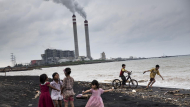Coal: Will the Paris Agreement go up in smoke thanks to Crédit Agricole and Société Générale?
Lucie Pinson, Private finance campaigner, Friends of the Earth France,+33 6 79 54 37 15, lucie.pinson@amisdelaterre.org

Lucie Pinson, Private finance campaigner, Friends of the Earth France,+33 6 79 54 37 15, lucie.pinson@amisdelaterre.org
Crédit Agricole and Société Générale are set to decide this summer whether to finance the extension of the Tanjung Jati B coal power plant in Indonesia, seven months after COP21. Friends of the Earth France, BankTrack and Greenpeace are calling on the banks not to make this mistake, and to instead withdraw from the project as BNP Paribas has already done. With an action in front of the Eiffel Tower today, Friends of the Earth France has sent a reminder to the banks that with this specific project their COP21 commitments for the climate are at stake.
Activists from Friends of the Earth France have carried out a banner drop from the first floor of the Eiffel Tower today to denounce the involvement of Crédit Agricole and Société Générale in the 2000 MW extension project (TJB2) of the Tanjung Jati B coal power plant on the island of Java in Indonesia.
The two French banks are currently analysing this project and could finance it despite its incompatibility with the international objective of limiting global warming to well below 2°C, and ideally no more than 1.5°C, adopted in Paris by the international community only a few months ago. BNP Paribas has already withdrawn from the project, putting pressure on its two peers, whose final decision could have serious consequences for the climate but also for their reputation.
Lucie Pinson, Private Finance campaigner for Friends of the Earth France, said:
"Where are their COP21 commitments? Already up in smoke? Instead of using the money entrusted to them locally, as Crédit Agricole claims to do in its recent ads, the bank will now have to explain to its clients that it is continuing to finance new coal, even after committing to do everything possible to ensure the aims of the Paris Agreement are met or even exceeded. The same goes for Société Générale, which has committed to align its financing with the 2°C scenario. Any decision to finance TJB2 would be a shameful hypocrisy."
This project is part of a bigger – and highly carbon intensive – national energy development plan to develop 13 gigawatts of new coal capacity for Indonesia by 2019, mostly on the densely populated and heavily polluted island of Java. But the banks know as well as NGOs the reports showing that the construction of new coal plants – or even the replacement of old ones – is not possible within the available carbon budget, even using the best available technology, and that a commitment to close the existing coal fleet is now necessary to stay below the 2°C threshold.
Yann Louvel, Climate and Energy Campaign Coordinator at BankTrack, commented:
"Tanjung Jati B 2 is a key test for the climate and for the banks which made commitments themselves at COP21. As World Bank President Jim Yong Kim reminded us recently, if Indonesia and the other South-East Asia countries build coal plants as planned, we are finished and this will spell disaster for us and our planet. It is therefore vital that these projects never see the light of day, and that's why NGOs are tracking investors so closely in this region of the world."
Bondan Andriyanu, from Greenpeace Indonesia, and who recently met with the two banks in May 2016, concluded:
"Financing TJB2 is to choose pollution, many deaths, and deforestation. As with many other Asian countries, we are already suffocating because of coal. Already 6,500 people die prematurely from coal every year and TJB2 could add 1,000 more. Not only will populations without access to electricity not benefit from TJB2, nor from other coal plants projects, but the expansion of coal mining concessions to meet the planned doubling of coal consumption will worsen deforestation in our country. Alternatives exist in Indonesia, and the country's enormous renewables potential could be developed more cost-effectively than coal. Crédit Agricole and Société Générale committed to take into account all these factors. We are now expecting them to follow the example of BNP Paribas and to withdraw from the project".
With today's action at the Eiffel Tower, the symbol of COP21, Friends of the Earth France has sent a reminder to the banks that their reputation is at stake and that the sincerity of their climate commitment and to the energy transition will be judged on the decision they take in the TJB2 case.
Friends of the Earth Japan is also today sending a letter to Nexi, one of the other financial institutions involved, demanding its withdrawal.
Notes for editors:
1. Project financing is expected to close this summer, after receipt of all the preliminary studies required by funders. The other banks involved in the $4 billion project are BTMU, Mizuho Bank, SMBC and Sumitomo Trust.
2. For more details about the action and for photos, contact Lucie Pinson on +33 679 543 715
3. See the briefing published in May by Friends of the Earth France and Greenpeace: "Indonesia: the climate test for Crédit Agricole and Société Générale" (in French only).
4. After some commitments regarding its support for coal mines and coal plants in May and September 2015, Crédit Agricole signed the Paris Pledge for Action.
5. See the summary of Société Générale's commitments before COP21.
6. The report "The Coal Gap: planned coal-fired power plants inconsistent with 2˚C and threaten achievement of INDCs", published in December 2015 by Climate Action Tracker, shows that even without new construction, emissions generated by electricity production from coal in 2030 would still be 150% above the necessary level to limit global warming to within the 2°C threshold.
Another report published earlier this year by Greenpeace, Sierra Club and CoalSwarm has shown that despite the fact that more and more coal plants are being closed, the speed of the closures is not fast enough to compensate for the opening of new plants:
The most recent report from Ecofys shows that even the use of the best available technologies for coal plants does not make coal compatible with the objectives adopted at COP21.

